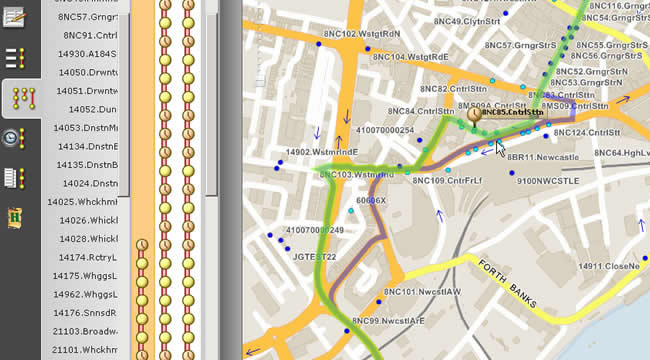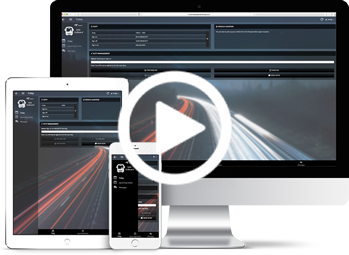8 Questions Local Authorities Should ask Fixed Route System Suppliers
1. Do you enable remote working?
As local authority budget constraints continue, remote working is an increasing requirement. Reducing the number of permanent office-based staff facilitates the consolidation of office space, thereby reducing costs associated with office space, plus electricity, heating and lighting costs.
Additionally, for those involved with fixed route data management there are significant benefits associated with remote working. For example Paul Goodwin from Bucks CC points out the advantages of being able to visit bus operators in person to talk through issues on a live system.
Furthermore, research by Stanford University suggests that remote workers are 13% more productive, take less time off sick, enjoy a quieter working environment, are more satisfied in their work and experienced less turnover than their office-based counterparts.
If you want to facilitate remote working, your computer systems need to be truly browser-based; accessible from anywhere.
2. Is it easy to implement & support?
For local authority transport departments, one of the most significant costs – and biggest headaches – is not the system they use, but the Information and Communications Technology (ICT) resource required to implement and maintain it.
Issues in this area relate to the cost of hardware; the cost of internal Information and ICT resource; and obtaining access to the ICT team. We even know of local authorities where important upgrades have not been implemented because the transport department can’t obtain the internal resource to apply them, or can’t afford the fees charged by the (now outsourced) ICT resource.
Adopting a cloud-based approach will ensure that all of the issues outlined above are somebody else’s concern, with all of the complicated elements seamlessly managed behind the scenes. Upgrades can be carried out remotely, with new versions live within a matter of hours – and there’s no need to source internal ICT support; all you require is a browser and an Internet connection.
3. Is this a ‘true’ cloud system?
It is important to be able to distinguish between ‘true’ cloud (read: browser-based) systems and those which may superficially appear to be so – for example, a remote access solution via Citrix or an equivalent.
A genuine browser-based system is accessed over the Internet via a web browser with no local desktop installation whatsoever. This offers greater security controls in line with Public Services Network (PSN) agreements; improved performance in terms of responsiveness; and greater ease of use.
But perhaps most importantly, a genuine browser-based system prevents much of the ICT involvement and overhead, as outlined earlier in this document.
4. Can we share data with other authorities?
We all know that bus services don’t stop at borders; all authorities manage cross boundary services and have a requirement to provide users with accurate and useful information. As an authority it makes sense that the more data you can see, the more you can improve the quality and usefulness of your outputs.
Many systems offer authorities the ability to share data via import and export routines, but true sharing of data is the ultimate goal here: If all authorities can see the same data – which we like to think if as ‘a single view of the truth’ – then they can decide how to work together and use this information to better inform the travelling public.
Once you have a system that truly facilitates sharing of data, the only barrier is the vision and willingness to do so.
5. Can we offer operators direct access?
The issues surrounding the management of schedule data are familiar to many involved with data management. Smaller operators often can’t afford their own scheduling package, so service information tends to arrive on pieces of paper that need to be manually entered into the fixed route management system.
The problem, of course, is that this process is prone to inaccuracy, and is woefully inefficient use of what is already a constrained internal resource. It just makes no sense to enter data more than once!
When talking about data we like to use the term, ‘Enter once, use many times’, which we consider a mantra for excellence in data quality. By opening up your scheduling system to operators you can ensure that data is entered accurately and more efficiently, freeing up internal resource from the requirement to re-enter data.
6. Can we jointly purchase with other authorities?
Local authority funding constraints have created an interesting conundrum: new technology can streamline operations and produce cost savings, but finding budget to do so is difficult.
Modern technology has the potential to solve this problem by making it possible for groups of authorities to collectively purchase a shared solution; thereby sharing the financial cost while working together to improve the quality of the scheduled data.
This is a solution we have deployed to Leicestershire, as part of which Nottinghamshire, Nottingham City, Leicester City and North East Lincolnshire will also benefit through the reduced costs of a shared, hosted infrastructure.
We view this as an important trend – and one that is set to continue.
7. Do you have a data expert?
Schedule data is undeniably complicated. Fixed Route systems can simplify processes, but some routes are just very, very complex.
A good fixed route data management system will ensure that most of your workflow is simple, but there will always be anomalies – and of course it’s the anomalies that cause the problems, since it only takes one issue to undermine confidence in the service in general.
We encourage you to ask your supplier what their approach is to dealing with complex routes. We believe it is extremely important to take a proactive and collaborative approach to data quality; that’s why we employ data experts who understand the UK transport market and common issues that impact on local authorities around the country.
8. Are schedule and passenger information databases on a single platform?
It is complex and difficult to maintain accurate data – which is why it is important to only ever enter it once if at all possible.
In an ideal world, your scheduling system would exist on the same platform as any real-time, journey planning and other passenger information systems, ensuring minimum data entry and maximising data quality.
Additionally, integrating these systems makes it much easier to make changes on the fly; after all, it’s much easier to make changes in one system than two or three. In this way you can be much more responsive, with data changes flowing quickly and accurately into the real-time system.

Here to help
Contact us and speak with one of our specialists:
+44 (0) 808 281 1039
More Info
About Us | Careers | Contact Us | Legal | Privacy
(c) 1999 – 2019 Trapeze Software ULC. All rights reserved
Trapeze Group respects your privacy

